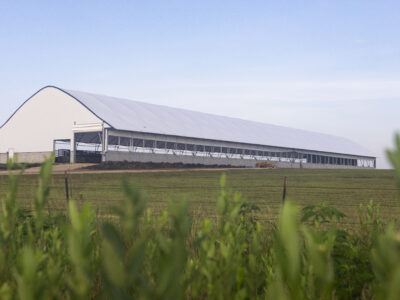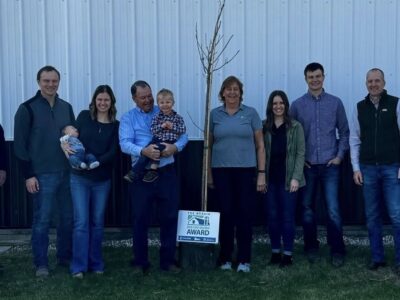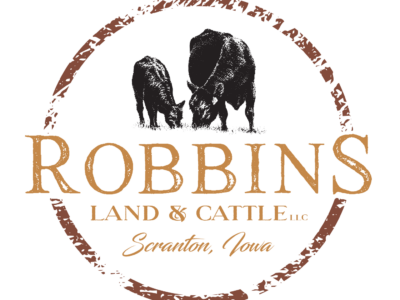Are you ready for a DNR inspection?
10-11-2024 in News Release
If it’s been 20 years, it could be time for review
Are you ready for a DNR inspection?
CSIF Executive Director Brian Waddingham says inspections are on the rise, and it’s important to know not only the rules and regulations, but your rights.
“With an increased focus on water quality, the DNR is more active and attentive than ever,” says Waddingham. “Farmers want to be in compliance, and we’re here to help make sure they are, and to help before the inspection process begins.”
Waddingham says in the past few months they have received calls from farmers wanting to build or grow, only to find their existing facilities are no longer in compliance. “Many times, the problem is a small issue, and not directly related to water quality,” he says. “But farmers need to make sure they are in compliance with the 250-plus pages of current rules and regulations, which can and do change.”
Waddingham sees six common areas to be aware of:
- Separation to water sources. This includes wells, creeks and rivers and even grassed waterways.
- Separation from neighbors. Separation distances have been adjusted through the years. If you have more than 500 animal units in confinement, you must meet separation from neighbors.
- Counting animal units. Animal units are different from the literal number of animals and depend on the type and species of animal. Different species of animals are counted together when raised in similar housing systems.
- Soil types. Karst soil types are extremely porous and have garnered much attention lately, especially in Northeast Iowa where they are common. Some activist groups are specifically targeting this area. Before starting construction on a new livestock facility, you need to check for karst soil. You must also check to see if your proposed livestock barn is in the flood plain. Building livestock facilities in a flood plain is prohibited.
- Manure management plans. If you have more than 500 animal units in confinement, you need a manure management plan. These plans need to be updated annually.
- Manure applicator license. Do you need one? If you have more than 500 animal units in confinement and you apply your own manure, you do.
“Whether it’s a confinement or an open feedlot, a lot of times solutions are an easy fix,” says Waddingham. “It may be as simple as changing the layout of a barn or adjusting animal units.”
CSIF provides a free, confidential, on-farm visit to answer your questions, assess your needs and recommend possible correction strategies.
“Remember, our services are confidential,” adds Waddingham.“Calling us will not trigger a DNR inspection. We’re here to get you ready should they come calling.”
The inspection
Waddingham says it is also important that farmers know their rights in the DNR inspection process.
Typically, the DNR protocol gives 7-10 days notice of an inspection. If they call and want to come the next day, you can reschedule if you have prior commitments that day. You also have the right to have another party present, something Waddingham recommends. “Two people hearing what is discussed is better than just one,” he says. “Another set of eyes and ears is always helpful.” That person may be a spouse, farm employee, CSIF staff or the third party of your choice.
“It’s also important when the next generation is coming on to the farm that they hear the DNR comments and are aware of the latest rule changes,” says Waddingham.
If the inspection is to include a manure management plan review, the MMP provider should be present to answer questions and note needed changes.
The inspection can take up to a couple of hours, and Waddingham cautions farmers to “not sign anything” on the spot without consulting their attorney. “Inspectors should not be asking you to, and most don’t. But know if you are asked, that is not normal procedure.”
Following the inspection, CSIF can come out and help interpret recommendations for corrections.
But, Waddingham stresses, there will be follow-up. “They will come back out,” he says. “They will check to see if corrections have been made.”
Iowa’s livestock farmers, like all Iowans, want clean air and water. They want to do things right. And so does CSIF.
In its 20 years of existence, CSIF has directly helped more than 5,300 farmers in Iowa, and answered around 20,000 follow-up questions.
CSIF offers free, confidential expertise to ensure environmental regulations are being met and, when it happens, the inspection process is handled professionally, straightforwardly and efficiently.
“A DNR inspection can be unnerving,” says Waddingham. “But we are here to help –before, during and after.”
The Coalition to Support Iowa’s Farmers was created by farmers to help farmers raise livestock successfully and responsibly. It’s a joint partnership involving the Iowa Beef Industry Council, Iowa Cattlemen’s Association, Iowa Corn Growers Association, Iowa Farm Bureau Federation, Iowa Pork Producers Association, Iowa Soybean Association, Iowa Turkey Federation, Midwest Dairy and the North Central Poultry Association.
The non-profit, non-partisan organization provides assistance to farmers at no cost. CSIF does not lobby or develop policy. Farm families wanting a helping hand can contact the Coalition at 1-800-932-2436 orwww.supportfarmers.com.
Recommended News

Accu-Steel Fabric Covered Buildings Invests in the Coalition to Support Iowa’s Farmers
Farmers interested in learning about the benefits of raising cattle under roof are invited to attend an open house at the Robbins family farm to tour Justin and Lacie Robbins...
Read More
Des Moines County crop and livestock farmers are leaders in their community and Iowa agriculture
Iowa Secretary of Agriculture Mike Naig will present the Wergin Good Farm Neighbor Award to the Dan and Jan Keitzer family of Des Moines County on Friday, April 11. The...
Read More
Robbins Family Hosts Cattle Building Open House
Farmers interested in learning about the benefits of raising cattle under roof are invited to attend an open house at the Robbins family farm to tour Justin and Lacie Robbins...
Read More